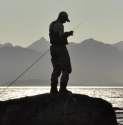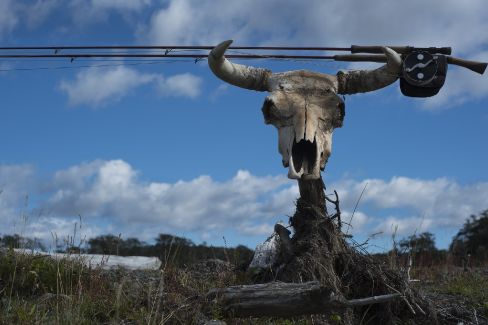Fd: How did you first get into fly fishing?
Göran: I was born with it. My father was a fly fisherman and he was also a rod maker in Sweden. I got my first fly rod when I was 5 years old, really early. And I was already quite a good fly caster when I was 7.Every fly fisherman in the area went to my father for advice, so I grew up with fly fishermen, rods, etc. Everything was bamboo those days, and the lines were made of silk, we even used cat-gut leaders because nylon wasn’t good yet; it was amazingly hard to use, we had to keep it wet all the time so it didn’t break.The flies in those times, very early in Sweden, were mainly dries and wets. I started fishing for trout and grayling when I was a child, and at the age of 13/14 I began going for sea-trout too, because I lived close both to the sea and the rivers.
Fd: How did your career as fly-fishing and casting instructor begin?
Göran: At the age of 14, I took over my father’s work on designing the rod actions, he used to do the rods and I handled the clients and discussed the action of each rod, we could change the actions on bamboo.At the same time, I started giving casting lessons to everybody that wondered how I made my casts, for in 1952 I had already started developing the Underhand technique.
Fd: Right, and how was the development of Underhand?
Göran: I cut my first line, then added a running line and began casting from the water in 1952. I’m an old man, you know. I made hundreds of lines with double tapers and sold them to people. I started teaching them how to use them when they had trees behind and in narrow places, etc.Before this, it was all overhead casting but in my rivers we had almost no place for back casts. That is the reason I began to teach, and now people use it all over the world.
Fd: How did you acquire your skills for Atlantic salmon fishing?
Göran: My father fished for salmon in Norway every summer. He used to stay there all season, so I started going with him when I was a kid, staying there 3 months every year. Pretty much all seasons since then, so I learned a lot. When you live in the river, with it, you live together with other fishermen and with the salmon too. You come to learn something. Today, I know everything on how to catch salmon, especially the big ones. I’ve never been a guide there or anywhere, it’s not my thing. I teach people about fishing but I never guide. I think one needs to have his own experience to learn, and I like to find my places by myself.
Fd: What’s the story behind the large arbor reel?
Göran: I used to fish with a regular sea reel when I was in the river on a boat. It was a really good reel to fight fish with -I fought hundreds with it- but it wasn’t fit for fly fishing. So, when I was working on developing gear for Loop in the 80’s, I met Kurt Danielsson and told him we should make a reel with a big spool, to control the fish. So, the idea to make it large arbor comes from me but Kurt and I made them together, he was the manufacturer.
Fd: About rods. In what kind of waters and conditions do you choose to use a two-handed rod over a single-handed one? What are the reasons that lead you to choosing one or the other?
Göran: All waters where you have big fish and you need to have very high control of the line are better for two-handed rods, you have a better control of the fly. You can do much more, turn it sideways, lift it, lower it, and more in a higher grade. At the same time, if you have a big fish on then you’ll have a much better feel with the double-handed rod. Plus, you have more power with a shorter rod, that’s the reason all tarpon rods are like that.Double-handed rods are mainly for high control, easy cast, and it’s easier for your body too, you have more power when you need to start a cast from the water, or trees on your back… They are also very good for strong wind spots.
Fd: More people fish with two-handed rods each day. What are your thoughts on the future of this tendency?
Göran: In some places, like Argentina, double-handed rods are sort of a new thing still, but we have used them in Scandinavia for 150 years. Today we have many more anglers in the big rivers using two-handeds, and people all over the world are getting to know the advantages of them. Single-handeds have their advantages too, of course. I even invented Underhand with single-handeds. So they come to work together in the end.
Fd: Whats your view on the fly-fishing world today in regard to the amount of information and videos available on the internet, magazines and else?
Göran: I think there a lot of things that end up being something like romantic, sort of kid things to me. I don’t watch videos, although I have made some myself for Swedish and Danish TV. Those have even got to be the most wanted replays in some stations for over two years. They called me the “Magic Man”, for with a fly rod I could do things that people had never seen, like the cast around the corner, for example; which is so useful for fishing dry flies upstream without the fish spotting the leader.
Fd: After so many years traveling due to fly fishing, have you got any favorites? What spots are you fishing these days?
Göran: I’m fishing all over really; I do it mostly for salmon in Norway, trout and grayling in Sweden... All of Europe, this year I’ve visited Germany too. I also fish in the USA.I’m travelling around all year long, some years I fish for 300 days. If I turn my head right now, I can see the river rapids, I have a 42 seconds walk down to the river.
Fd: Well, maybe you shouldn’t be talking with us, you could be out there! Final questions then: What does fly fishing mean to you and what advice would you give to beginner anglers?
Göran: For me fly fishing is very important. I don’t like to make a circus of it. To some it’s about catching many fish. Fly fishing is different for me; it’s really a way to live.You have to learn about nature and its behavior. I focus on the fish and its behavior. I wait all the time, I don’t make many casts, and I catch many fish that way. I can tell, when I see nature change, if the fish take or not. My advice is that one should listen to experienced fly fishermen, to fly fishermen one can believe in. There are many out there who talk bullshit, but you have to listen to those who you can trust. Then get your own experience.
About Göran Anderson's Salmon School:This year, The Salmon School opens on June 20 on the Verdal River located in Norway, less than 50 km from the Swedish border. There, Göran himself shares his knowledge and techniques to
catch salmon under difficult conditions.








